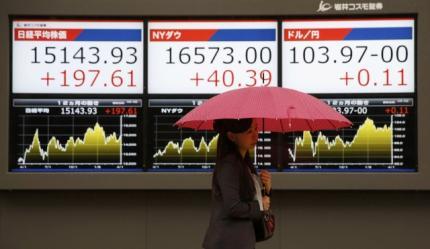Weak earnings set Asian stock markets up for repeat underper
Asia will remain a perennial favourite among emerging market investors for the medium to long-term

Asia will remain a perennial favourite among emerging market investors for the medium to long-term
Bareksa.com - Unless they are in for the long haul, global investors in Asian equity markets outside Japan should be prepared for returns this year to be below those of other markets once again.
Extrapolating from the shrinking profit margins seen in the latest batch of Asian corporate earnings, alongside weakness in global demand, analysts reckon stock markets in Asia are already too expensive.
They are also unlikely to deliver the 12-to-13 percent average earnings growth that, according to Thomson Reuters I/B/E/S estimates, market participants have been expecting.
Promo Terbaru di Bareksa
Asian stock markets have broadly yielded about 40 percent less in dollar terms than developed markets since the end of 2010. That hasn't stopped investors from pouring money into the region in the hope of a reversal of fortune.
This year, however, won't break the trend.
Slowing global manufacturing growth, rising local wages and dimming prospects for a recovery in exports have quashed whatever hopes investors may have had for a recovery in Asian corporate earnings.
"I am afraid that the earnings picture will continue to be uninspiring and I don't think you can expect much re-rating of stocks from the earnings," said Angelo Corbetta, the London-based head of Asia equities at Pioneer Investments.
"You don't have a strong global economic cycle, you have a weak dollar and that is playing against the export theory for Asian markets, and you have rising labour costs. So, it is really difficult for a company to get some economies of scale under the existing conditions," said Corbetta, who manages 3 billion euros across Asia.
Global equities rose 20 percent in 2013, while Asia-Pacific gained 9 percent. Within Asia, Japan's Nikkei outpaced the region with 57 percent gains in local currency terms.
Markets such as India, Malaysia, Taiwan, Australia and Vietnam all had gains between 9 and 22 percent in 2013, buoyed by expectations that economies in Europe and the United States are well on the road to a recovery that will lift corporate revenues globally.
MSCI's Asia-ex-Japan index is up another 1.5 percent so far this year.
That rise in share prices has stocks in Asia ex-Japan trading on average at 13 times their expected earnings this year. The Philippines is by far the most expensive, with a price-earnings (P/E) ratio of 19, but India, Indonesia, taiwan and Hong Kong are also not cheap at ratios above 15.
"A recovery is pretty much priced in," said Herald van der Linde, HSBC's head of Asia-Pacific equity strategy. "Now, it is really a delivery of these earnings which is going to drive the markets higher and that means it is not going to be as exciting as it was last year."
HOW FAIR?
Market valuations, to be fair, are not high from a historical perspective.
Average stock prices are about 11.5 times their 12-month expected earnings, which isn't as cheap as in 2011 when expectations for earnings growth were just as bleak as they are now but prices were roughly just 9 times earnings.
Yet, stocks currently aren't as expensive as in some phases of a rally in 2007 or 2009, when P/E ratios were between 15 and 18.
But margins and earnings might disappoint even those modest expectations. HSBC's van der Linde estimates Asian earnings will only grow 8 to 9 percent this year, almost the same pace as in the richly valued U.S. stock market, and overshadowed by 13-14 percent growth in Europe.
Bank of America Merrill Lynch's compilation of latest earnings from Asia shows Korean earnings fell 21 percent from a year earlier, Thailand's fell 11 percent, India's grew just 6 percent while the Philippines and China had 10 percent growth.
The macro backdrop has been dispiriting too, with a tightening in money markets in China, Asian exports to the West falling and uncertainty over the dollar's direction.
The realisation that 2014 will be disappointing is gradually showing. Earnings are expected to grow more slowly, and there are on average more downgrades than upgrades to analysts' estimates of profits.
While equity-focused investors continue to seek Asian markets, they remain choosy, picking growth stocks or those leveraged to Europe and staying underweight expensive markets, such as Indonesia's.
For most other investors, however, the gap between equity returns and corporate bonds, some of which offer double-digit yields, has narrowed significantly to the point that the relatively risk-free bond investments seem a better bet.
"In general, Asia will remain a perennial favourite among emerging market investors for the medium to long-term," said Samarjit Shankar, New York-based global markets strategist at BNY Mellon. BNY Mellon manages about $27.5 trillion of custodian flows.
"But on a risk-adjusted basis, or on a real-yield basis, corporate bonds and even government debt is giving you a lot more bang for your buck as opposed to weaker to subdued earnings on the equities side," Shankar said. (Source : Reuters)
Pilihan Investasi di Bareksa
Klik produk untuk lihat lebih detail.
| Produk Eksklusif | Harga/Unit | 1 Bulan | 6 Bulan | YTD | 1 Tahun | 3 Tahun | 5 Tahun |
|---|---|---|---|---|---|---|---|
Trimegah Dana Tetap Syariah Kelas A | 1.384,88 | ||||||
Trimegah Dana Obligasi Nusantara | 1.095,38 | - | |||||
STAR Stable Amanah Sukuk autodebet | 1.084,98 | - | - | ||||
Capital Fixed Income Fund autodebet | 1.853,59 | ||||||
Insight Renewable Energy Fund | 2.287,69 |

Produk Belum Tersedia
Ayo daftar Bareksa SBN sekarang untuk bertransaksi ketika periode pembelian dibuka.

Produk Belum Tersedia
Ayo daftar Bareksa SBN sekarang untuk bertransaksi ketika periode pembelian dibuka.